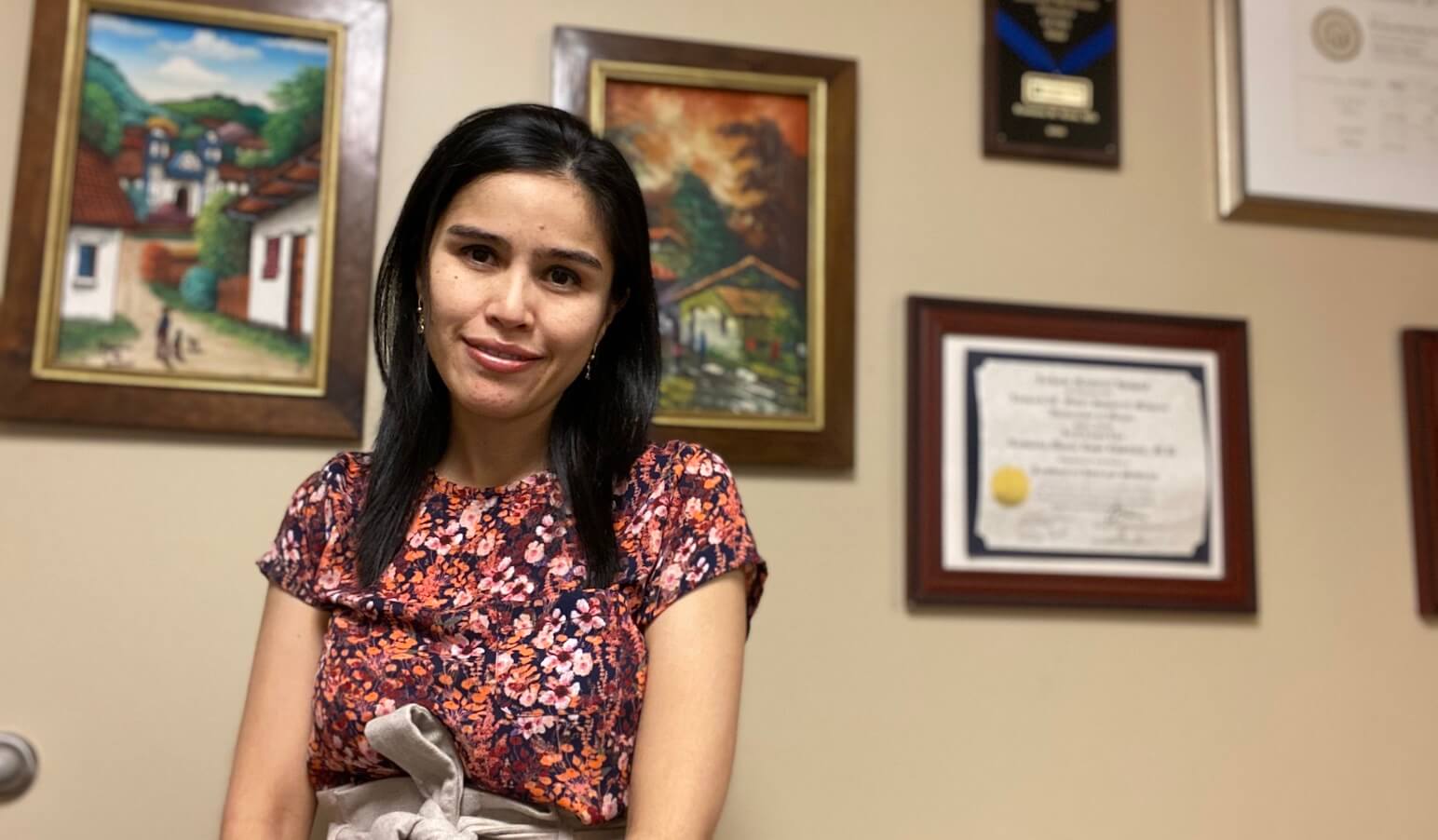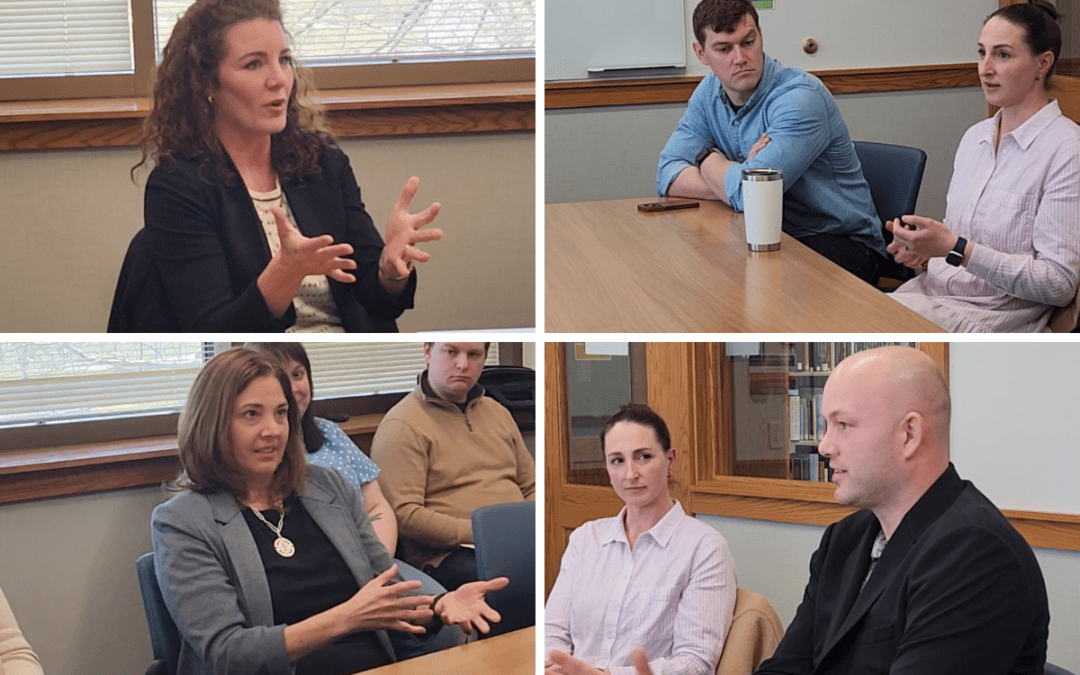
Most days, Iowans check in on the news to keep track of the coronavirus pandemic’s latest developments in the state.
One of the experts we rely on is Dr. Rossana Rosa. Rosa came to Iowa via Jackson Memorial Hospital in Miami, Florida, and now works as an infectious disease specialist at Unity Point in Des Moines.
The number of people infected with COVID-19 is alarming. On Monday, the Iowa Department of Public Health reported 1,661 new coronavirus cases and 13 deaths linked to the respiratory disease.
Hospitals are close to capacity and regularly scheduled procedures for non-COVID-19 patients have been delayed.
I wanted to learn more about what we are facing and, in the process, got to know Rosa and how she has made Iowa home for her and her family.
Rosa was born in Tegucigalpa, Honduras. Her parents are from Gracias, Lempira, a “department,” or state, in Western Honduras.
As a teenager, while visiting family in Gracias, she was asked to interpret for a medical brigade from the U.S. She is bilingual in English and Spanish, and her mother encouraged her to help. This ignited her interest in medicine.
[inline-ad id=”2″]
She attended the Universidad Nacional Autónoma de Honduras to study medicine. Upon graduation it became clear how difficult it would be to find a good job in Honduras, so many of Rosa’s colleagues set their sights abroad.
One of her friends was heading to Miami and suggested Rosa should go too, so she prepared and passed the licensing exam and joined the Internal Medicine Department at Jackson Memorial Hospital in Miami.
What steered her to follow the infectious disease specialty was an early experience in Honduras. While in clinical rotations as a medical student she tended to patients with HIV. Her attending physician was highly knowledgeable and one of the top specialists in the country.
“We had patients that had HIV, tuberculosis and other infections yet we could treat them, and that was great. In Honduras we had fewer resources, yet folks were more resourceful,” said Rosa.
She explained that in Miami, by virtue of its diversity, infectious diseases can be extremely challenging, and this deepened her interest in the field.
“This is a field I felt one could diagnose, prevent and often cure a disease, at least that is the way I saw it. I think I had a naive view of infectious diseases.”
[inline-ad id=”0″]
At the end of her infectious disease fellowship in Miami, Rosa came to Iowa in 2016 to work for Unity Point.
“It felt right,” Rosa said of the move. “Everyone was nice and helpful and that was quite something. I do think in terms of who I am, is that for the first time in my life I felt that I was in a minority. I can say I have been very lucky in the sense that I have never had an episode of discrimination towards me. That does not mean it does not exist. It’s one of the first things you always wonder — how are people are going to perceive me?”
Of her new Iowa experience, she added: “The biggest thing for me that was truly amazing is how much people just did their job with so much joy. I mean, nothing seemed like an imposition.”
As the coronavirus pandemic arrived and halted life as we knew it, Rosa emerged as one of the top experts in the state. She is active on social media, providing regular insight on the pandemic in Iowa.
#Iowa– we'll keep breaking records for the next weeks.
Things are not OK as usual. To get through these difficult times we must take care of each other by:
☑️#MaskUp
☑️Avoid gatherings beyond your household
☑️Avoid indoor places
☑️#PhysicalDistancing
☑️Wash your hands pic.twitter.com/WWUTVtqbp4— Rossana Rosa MD MSc (@DrRossanaRosa) November 12, 2020
“As our hospitals went through the spring, it helped prepare us on the technical aspect of the pandemic: how to oxygenate a patient, we learned therapies, steroids to use, what we should not use. In terms of technical preparation, we have learned how to care for our patients.”
[inline-ad id=”1″]
Eight months in, the pandemic in Iowa is the worst it has ever been, with case counts, hospitalizations and deaths at all-time highs.
I asked Rosa for her advice to Iowans and to those most impacted by the pandemic — people of color and those with underlying health conditions.
She understands we all place a high value on community, but we must become creative about our customs and traditions during this time.
“Being gathered in the same room is absolutely unsafe,” Rosa said. “We have ways to be there for each other, but not in person.”
Some of her suggestions to be there for each other include technology such as Zoom for those who can, also drop-offs of food and other necessities, or a call or a family meeting over a commonly used application like WhatsApp.
“We don’t have to abandon each other,” she said.
She also pointed out that for immigrant communities to express our love at a distance is not something entirely new.
“This year we have to make sacrifices so we can celebrate together next year.”
[inline-ad id=”4″]
Here is her advice for the holidays.
- Wear a face mask and wear it properly
- Maintain physical distance, with a minimum of six feet
- Avoid crowds of more than 10 people
- Avoid poorly ventilated settings/space
- Wash your hands often
For those who may hold events outdoors, the same recommendations apply.
Rosa said we cannot live and go around pretending things are normal. The sooner we abandon this idea the better.
When it comes to our governmental leadership, I asked, are the measures in place enough?
“I think messaging could be more consistent,” Rosa said. “Some measures would have been more useful in the course of what was happening and how we adapted to them at times was not ideal. When many of the places that are high risk settings are allowed to stay open, that sends a message. If the bar is open, I can go to the bar. People tune in to different levels of your message.”
[inline-ad id=”5″]
To me, many of the directives from the state are confusing.
“I do think messaging is important and as straight forward as possible: don’t gather, don’t be in poorly ventilated places and don’t be in crowds. Instead, [there is] caveat after caveat. A simple consistent message is very important. I would like to see a mask mandate that is simply, ‘wear a mask.'”
In her opinion, businesses should also receive more support from the government as they navigate gathering restrictions and fewer customers.
News of multiple promising COVID-19 vaccines has Rosa “hopeful,” she said.
“This is great, the results are extremely good. Of course, we need to see the full data. The numbers and results tell us that the vaccine does work, even if they have a slightly lower efficacy than announced, that still works.”
This question begged to be asked: Would you take it? “Of course,” Rosa said.
[inline-ad id=”7″]
We are all excited for the prospect of a normal life.
Rosa, a mother to a young daughter, has ideas of what she will do when it is safe to return to normal activities.
“Go to the children’s museum with our toddler and play,” she said. “We love the botanical garden. We love watching soccer games with friends, going to a bar and watching a soccer game, the normal things that we usually enjoy. I want my family to be able to visit from Honduras. They could not do so this year.”
Looking toward the future, as unknown as it is, my closing question for Rosa was about preparing for unforeseen challenges.
“It’s important that we trust science, but it is also important that we choose people to lead us who trust science and trust public health. Science matters. Seek reliable sources of information. Make sure we are represented by people that trust science.”
By Claudia Thrane
Posted 11/23/20
Iowa Starting Line is an independently-owned progressive news outlet devoted to providing unique, insightful coverage on Iowa news and politics. We need reader support to continue operating — please donate here. Follow us on Twitter and Facebook for more coverage.
Politics

6 terrifying things that could happen if the Comstock Act is used to target abortion
Does 1873 sound like a really, really long time ago? Well, that’s because it is—but if Republicans and far-right anti-abortion activists have their...

Iowa parents explain how ‘fetal personhood’ would harm IVF
Lyndi Buckingham-Schutt and her husband Andy Schutt, both Des Moines residents, always knew they wanted to have children. When Lyndi was 30, they...
Local News

No more Kum & Go? New owner Maverik of Utah retiring famous brand
Will Kum & Go have come and gone by next year? One new report claims that's the plan by the store's new owners. The Iowa-based convenience store...

Here’s a recap of the biggest headlines Iowa celebs made In 2023
For these famous Iowans, 2023 was a year of controversy, career highlights, and full-circle moments. Here’s how 2023 went for the following Iowans:...




